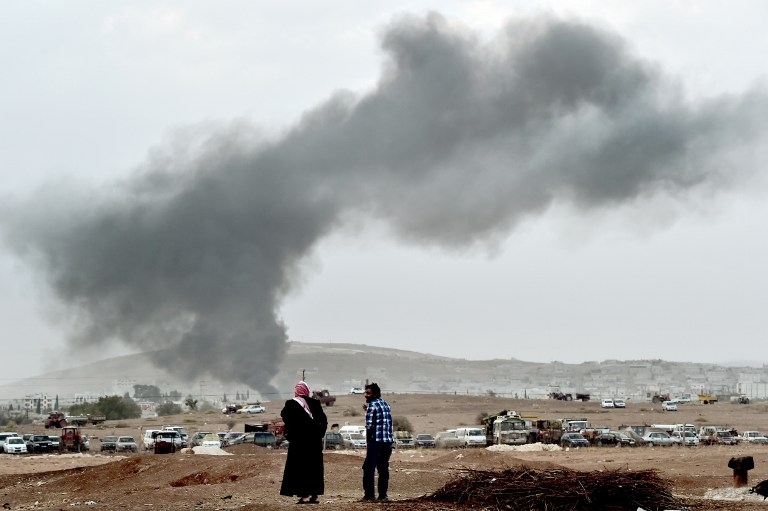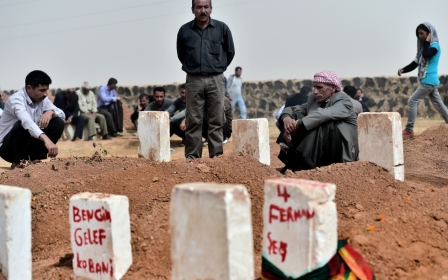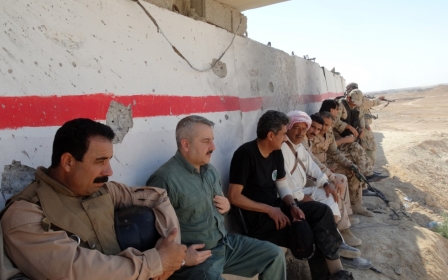As US lauds anti-IS campaign, questions linger about long term plan

Military commanders from the United States and its allies met in Washington on Tuesday for top-level military talks on the fight against Islamic State militants in Syria and Iraq.
A US official said the meeting provides an opportunity to “take stock” of coalition progress and "continue to align and fully integrate the unique capabilities of coalition partners."
Washington has hailed signs of progress in the fight after a wave of airstrikes this week hammered Islamic State militants near Kobane, the Syrian border town under siege for nearly a month.
"We're in the early days of the execution of that strategy. But certainly the early evidence indicates that this strategy is succeeding," White House spokesman Josh Earnest said on Tuesday.
"There are specific episodes where the use of military force has succeeded in beating back an ISIL advance or stopping the siege of a vulnerable humanitarian target," he said, using another IS acronym.
But questions remain: will airstrikes alone be enough to defeat a group embedded amongst civilians? With Obama ruling out sending combat troops who will lead the coalition’s fight on the ground? What happens after the strikes? How to reconcile the interests of such a diverse coalition?
The US, which leads the coalition, initially launched strikes in Iraq on 8 August and widened its campaign on 23 September to include Syria, where IS has its headquarters. Obama has promised a comprehensive strategy to “degrade and ultimately destroy” IS.
Nearly two months into daily bombing raids by coalition warplanes however, the Islamic State group is showing few signs of waning. In the past week, the group has captured nearly half of the Syrian border town of Kobane and seized most of Iraq's largest province, Anbar.
On Sunday, the US called in Apache helicopters to save Baghdad's airport from being overrun by the Islamic State.
"They were within 20 or 25 kilometers [of Baghdad airport] and had they overrun the Iraqi unit, it was a straight shot to the airport. So we're not going to allow that to happen; we need that airport,” Staff Gen. Martin Dempsey told ABC news.
Though the strikes do not seem to have hurt IS territorially, analysts say, that may not be the criterion by which the coalition judges its campaign.
“I don’t think anyone expected a couple of weeks of air strikes to make a crucial difference and destroy the group,” said Aron Lund, editor of Syria in Crisis.
“The US has always presented this as a long-term strategy. They are trying to drive them underground, make it difficult for them to communicate, run large convoys. It may not have an immediate impact, but is designed to pressure the group in the longer-run.”
One of the biggest problems facing the coalition, analysts and journalists say, is that the airstrikes are not being followed up with an effective ground offensive.
“It’s not clear what happens once you liberate an area from ISIS. Who takes the territory? Who controls it? Who steps in and administers the area?” said Michael Stephens, deputy director of RUSI Qatar.
Lund says there are no obvious candidates.
"Kurds want independence, the Shia government in Baghdad is aligned with Iran, the rebels in Syria are a mess... Asad is there but the US won’t work with him," said Lund.
Turkey's critical - but yet unclear - role
Turkey's call for the establishment of a protective buffer zone along its border with Syria, where IS have pushed into the heart of the predominantly Kurdish town of Kobane, was expected to be on the agenda of Tuesday’s meeting in Washington.
Answering questions about Turkey's reluctance to join the coalition's fight at a Tuesday press conference in Paris, where he met with his French and Russian counterparts, US Secretary of State John Kerry said that Turkey has agreed to host, train, and equip people and to use certain facilities.
Kerry's comments come a day after a Turkish official denied that the country planned to allow the US to use its airbases for anti-IS bombing missions in response to a US official who said Turkey had agreed to it.
Analysts say Turkey’s territory is essential for challenging IS in Syria.
"Without it, IS will continue to have a free reign there," said Andre Colling, a Middle East and North Africa analyst at Red24, a crisis management assistance company. “For the US, the question is, do they want to risk a confrontation with both IS and the Assad regime? I don’t think they will want that and I would be surprised if they agreed to a buffer zone without Syrian government consent.”
Aside from the issue of militarily dislodging IS, there remains the question of hearts and minds.
For the campaign against IS to succeed, a military plan must be backed up with a comprehensive plan to deliver humanitarian aid to those areas, said Edward Dark, a journalist from Aleppo, who writes under a pseudonym and has visited IS-controlled parts of Syria.
“You are talking about people that have been suffering under civil war for years. Unless you fulfil the basic needs of these people, IS will always have a foothold, some latent support. For me, that is what’s missing from the strategy to combat IS.”
Dark said that in Raqqa, an IS stronghold in eastern Syria, the Islamist militants, after hearing about the coalition strikes, had moved into heavily-populated neighbourhoods.
“They moved into regular apartment blocks where families are living. Now they keep a low profile, they don’t gather in large groups but they are still there, they haven’t moved out,” said Dark.
“Time is not on the coalition's side. IS have established religious schools, they are recruiting young children, in poor, deprived areas, filling their minds with propaganda. When these kids grow up in a few years, a new generation of IS will emerge. Airstrikes may make the threat go dormant for a few years, but it will re-emerge.”
New MEE newsletter: Jerusalem Dispatch
Sign up to get the latest insights and analysis on Israel-Palestine, alongside Turkey Unpacked and other MEE newsletters
Middle East Eye delivers independent and unrivalled coverage and analysis of the Middle East, North Africa and beyond. To learn more about republishing this content and the associated fees, please fill out this form. More about MEE can be found here.




